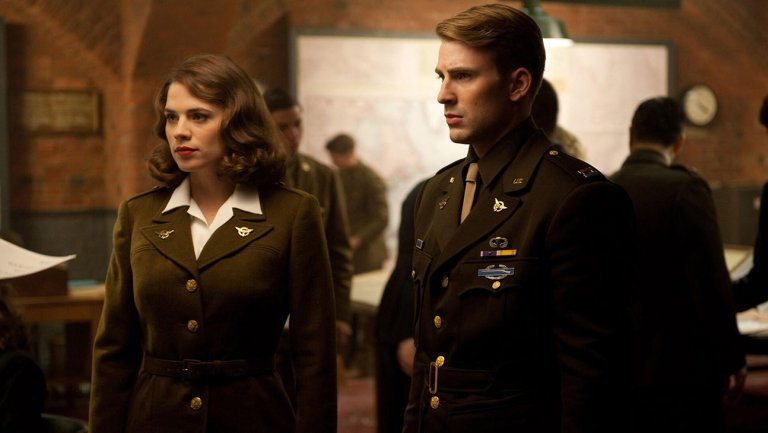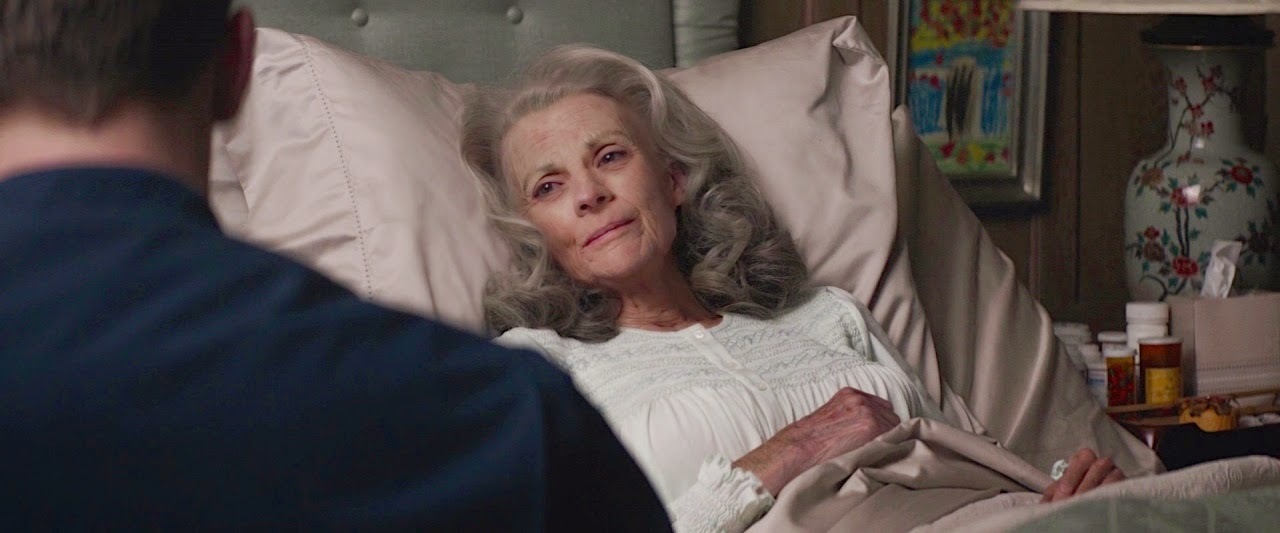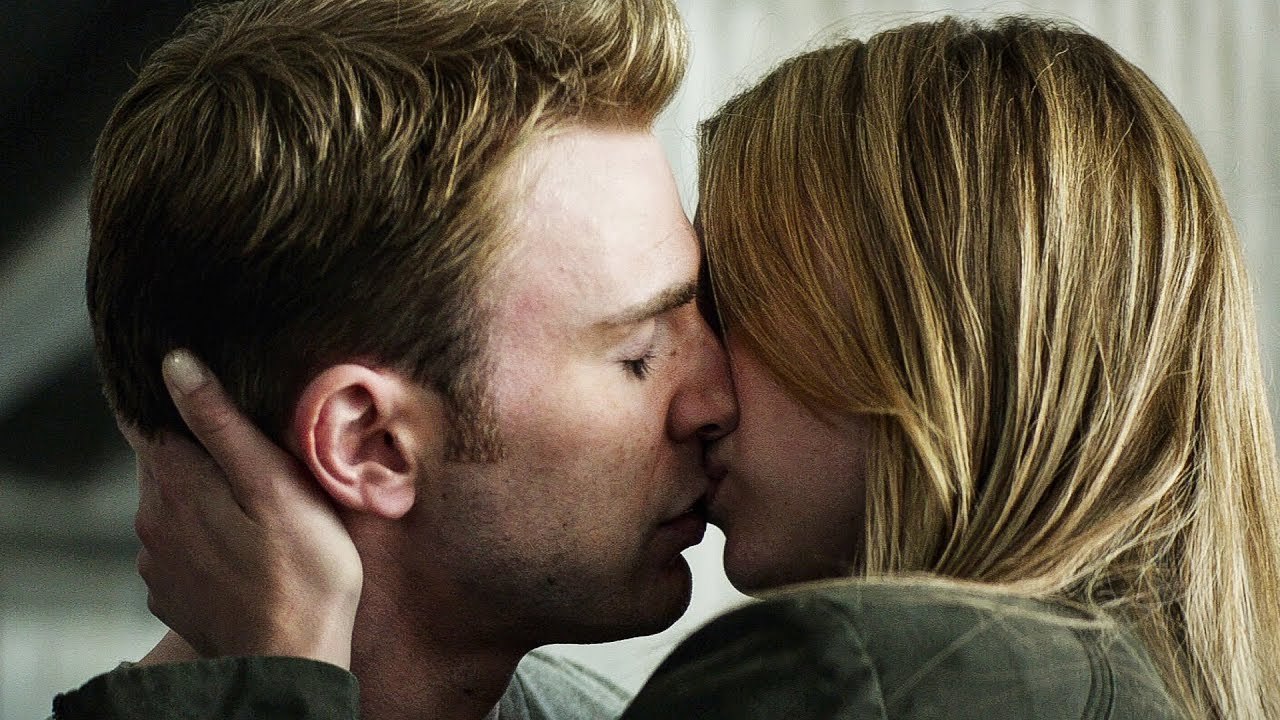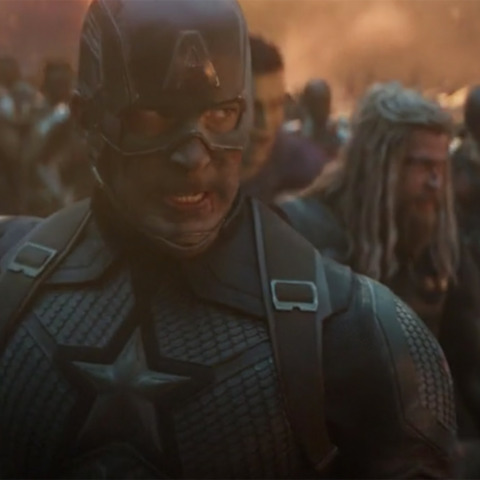The biggest movie of all time, Avengers: Endgame is now available to watch digitally. The home release comes with plenty of special bonus features, including audio commentary.
Bizarrely, however, one of said bonus features is actually only available on the digital release of the film as opposed to the more expensive Blu-Ray. (Perhaps some sort of deadline was missed here? Who can say.) Welcome to "Steve And Peggy: One Last Dance," a 5-minute montage featuring some clips from The First Avenger (and one from heavily truncated from The Winter Soldier) a handful of pointedly fluffy interviews (almost entirely recycled from the other featurettes) in which cast and crew recap Steve's journey in the MCU for the first 3-minutes, and then Anthony and Joe Russo do their level best to convince us that the Captain America trilogy, two movies of which they directed, actually wasn't about what they made it about for the last two.
"I always found it very endearing about Cap," Anthony Russo says in the featurette, "that for all that character has sacrificed--and he's sacrificed a lot--the one thing he could never let go of was Peggy Carter."
Cue the Curb Your Enthusiasm theme song, please.
Sure, the first movie in the Cap trilogy, Captain America: The First Avenger, is all about the sacrifice. But that's not where the story ends for either character--in fact, it's not even the part of the story the Russo Brothers themselves directed. The First Avenger is act one of a three-act play, and like every movie in the MCU, is not designed or intended to be viewed in a vacuum, no matter how badly the Russo Brothers seem to wish, now, after the fact, that we would all do just that.
The irony here is that the movies they seem to hope we forget the most are the two they themselves directed, all in favor of one major last-minute change to Cap's thematic arc in their final MCU movie. But to really get a sense of just how completely bizarre these assertations are, let's take a closer look at just how the Russo Brothers shaped Steve Rogers' narrative and thematic arcs with regard to Peggy Carter.

Recapping The First Avenger
For the sake of argument, we'll be taking a few things in good faith. One, The First Avenger really does put in the work to emphasize a connection between Steve and Peggy, and that connection is extremely meaningful. Two, the connection between them is served up over roughly 40 minutes (I did the math, don't worry) and 13 major scenes--these numbers are pretty significant. That's a little less than half of the entire movie's runtime.
Of those major scenes, nine of them are clearly intended, for better or for worse, to have some sort of romantic under- or overtones. From the cringe-y misunderstanding about the meaning of fondue to the first actual kiss, The First Avenger put a lot of weight on the shoulders of the chemistry between Steve and Peggy and for the most part, it paid off. The end result is a sweet, heartbreaking story of a missed connection that serves to build the foundation for Steve Rogers as a character within the wider MCU. Their last bit of dialogue with one another sets a date, "8 o'clock, The Stork Club, don't you dare be late," for a dance they both know they'll never have. Cue the waterworks.
No matter where you happen to fall on the spectrum of buying into Steve and Peggy's soulmate-level connection, it's clear that director Joe Johnston and writers Christopher Markus and Stephen McFeely wanted it to do a lot of narrative legwork. It's a nice shorthand and a quick way to make audiences emotionally respond and empathize (who doesn't love a good doomed love) with new characters. It's also an easy, no-muss-no-frills way to build drama and tension in not a lot of time. According to the text of the film, Steve and Peggy were in love, and that love never really got to come to any meaningful fruition because Steve is just too damn heroic and too damn selfless. What a jerk.
But in addition to all of that, we also need to establish something else: That in the scope of the shared universe and series of interconnected films that make up the MCU, those qualities run out of gas pretty fast. There has to be more to Steve Rogers than being the guy who sacrifices things if he's going to be a tentpole character in a multibillion-dollar franchise, the same way Tony Stark can't just be the snarky drunk and Thor can't just be the old English jock. He has to actually move from where he started. The First Avenger doesn't exist in a vacuum.

Enter The Winter Soldier
The Russo Brothers' MCU debut was, inarguably, a smashing success as they cranked out one of the most beloved and universally acclaimed entries into the line up to date with Captain America: The Winter Soldier.
While not technically our first look at present-day Steve Rogers--that dubious honor belonged to The Avengers--TWS was the first time we got to really experience him outside of a large ensemble cast. The Avengers relied heavily on the most basic principles any audience member would know about Captain America to establish who he was on the team: He's a soldier, he has a shield, he's from the 1940s. TWS took the ball and ran with it.
Stripped of those basic tropes and cliches, what would a strategist from World War 2 actually be like in modern society? How would someone with such a staunch moral code cope with working in the sometimes less-than-moral modern military sector? How was Steve Rogers, the man, rather than Captain America, the symbol, responding to his life being flipped completely upside down?
The answers to those questions weren't simple or direct. TWS found forward momentum for Steve's character everywhere it could. It introduced Sam Wilson, Steve's first real modern friend who allowed him to showcase a sense of humor and self-aware wit about the things he'd missed in pop culture; it partnered him up with Black Widow, who delightfully kept him on his toes and tested his limits; it gave him a brand new fighting style, a new attitude, and a new costume. But, perhaps most importantly, it completely pivoted his dynamic with his own history through a recontextualization of Peggy Carter.
Unlike The First Avenger, Peggy only gets a scant four minutes of screen time in The Winter Soldier. She's still alive, but well into her 80s here in 2014, struggling with dementia quietly in a civilian home. Obviously, this Peggy is no longer a romantic aspiration, she's become a sort of role model. She's "lived a life," and hopes Steve can go on to live his own. Her small scene is juxtaposed against video footage showing her back in the 50s, well after Steve's death, where she talks about all the ways in which she moved on after Steve's sacrifice and all the ways he positively affected her life. These clips are mirrored against her back in the modern-day telling Steve that "the world has changed, and none of us can go back. All we can do is our best and sometimes the best we can do is to try and start over."
The weight of this scene could be nostalgic if it weren't for the time taken within the first two minutes of the movie for a conversation with Sam that allows Steve to directly confront the fallacy of living in the past. "You must miss the good ol' days, huh?" Sam asks. "Well, things aren't so bad. Food's a lot better, we used to boil everything. No polio's good. Internet, so helpful," Steve responds. This is not a Steve who longs to go back, even if he still feels the loss of his old life in a very real way. He's growing and changing in a way that is anything but easy, but in a way that matters.
To lean in even harder to that idea, TWS includes a subplot in which Natasha keeps trying to set Steve up on dates. This sparks the beginnings of a precarious romantic tension with the newly introduced Sharon Carter, who is eventually revealed to be a SHIELD agent and Peggy's niece.
Sure, it's really awkward when you think too hard about it, but one or both of the Russo Brothers made the call to keep that particular bit in not just this movie, but their next one too--it didn't just sneak by accidentally. And, when viewed in the context of the rest of the story, it's impossible to ignore the (admittedly extremely half-hearted) positioning of Sharon as Steve's new flame. Again, we're back to a place where we're meant to see Steve moving on. Weirdly, begrudgingly sometimes, and in the most awkward way possible, sure--but moving on nonetheless.
There's not much time for bizarre inter-generational love connections, however. Things get sticky when the climax of the movie pits Steve against some literal ghosts of his past, revealing that his dead best friend is alive and brainwashed by the organization he gave his life to destroy in The War. The figurative, internalized fight Steve is having with himself is now both very literal and very external. Steve may be trying to be done with nostalgia, but nostalgia certainly isn't done with him.
At this point, the symbolic weight of the past is shifted entirely off of Peggy and placed squarely onto the shoulders of Bucky Barnes, removing Peggy from the narrative equation entirely for the rest of the movie. Unlike Peggy, Bucky doesn't represent a success story--he didn't survive Steve's death to lead a happy and fulfilled life and he doesn't have a valuable lesson to impart about the necessity of never slowing down. Peggy's singular scene emphasized the fact that she no longer needs Captain America to save her. Bucky, however, has never needed him more.

An interlude, and a Civil War
It's important to note that there was one movie featuring Captain America that the Russos themselves did not make in between The Winter Soldier and Civil War. Avengers: Age of Ultron is a bit of an odd duck in the sequence--but one that, nonetheless, did pick up some of the threads TWS had laid. Peggy was featured in this one as a Scarlet Witch-induced hallucination that not-so-subtly highlighted just how troubling the idea of Steve "going home" to the 1940s actually would be--troubling enough that the thought actually clued him in to the fact that it was all an illusion.
Later, in a conversation with Tony, Steve really brings it home. "I don't know. Family, stability. The guy who wanted all that went in the ice 75 years ago. I think someone else came out." Melodramatic, sure, but the point holds true. Steve's priorities have changed. We knew that from TWS, but here we see it spoken into existence on screen even more clearly.
Those new priorities don't just go away. Against all odds, the Russos' next Captain America movie managed to make Peggy's symbolic position in the Steve Rogers story even less subtle than her literally speaking the words "start over" to his face. Like TWS, Peggy is only given one scene in Civil War--but this time, she's not actually in it. It's dedicated to her funeral.
After tearfully acting as a pallbearer, Steve listens to Sharon give a speech about her aunt, which inspires him to really commit to the tension brewing between him and Tony. They're actually fighting over superheroic accountability (among other things), but the argument manifests in the text as an emotionally fraught, diplomatic tug-of-war over the fate Bucky Barnes.
Remember how Peggy acted as a thematic springboard for Bucky's new position in Steve's life back in TWS? We're doing that all over again, this time with the stakes cranked up to 11.
Peggy's off-screen role in Civil War is, in that way, to drive Steve even closer into the proverbial (or literal, depending on who you ask) arms of his best pal Bucky. Or, alternatively, to wingman her niece from beyond the grave into one of the weirdest on-screen kisses in the MCU, when Steve and Sharon "finally" admit they have feelings (?) for one another after their minute or so of pointed anti-chemistry back in The Winter Soldier.
Either way, the narrative throughline of the Russo's take on Peggy Carter has reached its inevitable conclusion. She is gone. The past is literally buried. And her memory is the fuel in the engine that keeps Steve pressing forward as a constant reminder that there is life after great tragedy--even if he has to really, really fight for it.
Also, yeah, making sure to include a scene of Steve kissing her niece is maybe the least subtle way the movie could make the point that he's moved on--next to, you know, actually burying her, I guess.

So where does that leave Endgame?
Here's where things start to get strange. If the bonus features and the final cut of Endgame are any indication, we're meant to believe that the arcs occurring in both The Winter Soldier and Civil War, as well as the little grace notes found in Age of Ultron, were, somehow, unintentional. That the repeated motifs that painted Peggy as the center of Steve's forward trajectory, and the constant refrains involving "starting over" were actually just very sneaky ways to say that Steve had, in fact, never gotten over her.
It's not that that is the wrong or an invalid story to tell--The First Avenger tee'd up a timeless love story with Steve and Peggy at the center just fine--but that's not the story that the Russos elected to tell. Instead, they used Peggy for a grand total of two scenes, each built to emphasize something wholly other than romance, and then pivoted Steve into the arms of another woman--or, perhaps more honestly, onto a collision course with Bucky Barnes.
Each moment the Russos' included in their films was deliberate. It's not an accident that the compass Steve carried with him in The First Avenger with Peggy's photo made only one split second appearance in one of their films (and never again in any of the other MCU films until Endgame for that matter). Nor is it an accident that Sharon Carter was painted, however briefly, as a romantic lead. It wasn't incidental that Bucky Barnes was the crux of the drama for years, and it certainly wasn't for nothing that Peggy's scenes were built to emphasize looking toward the future. Steve's stories could have, very easily, been constructed around his inability to let go of his lost love--but they never were.
At least not until Endgame. Not until the Russos--or someone at Marvel Studios--had a very abrupt change of heart. It turns out all of Steve's heroism has really, secretly, revolved around his inability to get over his sort-of-girlfriend from The War. It was all just waiting game; putting in the hours until he could be given his prize (a literal trophy wife in this case) one way or another, even if that meant returning to the halcyon days of the 1950s. Stranger still, it wasn't even the actual dance date that was promised--The Stork Club, 8 p.m., 1945. It was something else entirely, which is apparently supposed to be just as satisfying, because who cares about the details when you're cherry-picking which parts of your stories you want people to remember?
The scene is meant to be understood in a vacuum, devoid of any and all context of Steve's cinematic journey and relying specifically on the information contained within Endgame and only Endgame. We're meant to feel happy, that he's finally gotten the thing he's secretly wanted all this time, despite what the other stories have told us over and over again. We're supposed to feel like he deserves the "win," or that he's "earned" this moment of selfishness.
But like every MCU movie, viewing things in a vacuum isn't the name of the game. So much for liking the internet, modern food, and polio vaccines. So much for starting over being the best we can do. So much for the guy who went into the ice being different from the guy who came out. So much for never being able to go back. So much for a narrative arc that doesn't suddenly wrap around on itself to become a complete circle. Part of the journey is the end, right? And sometimes the end is right back where you started, I guess.
So, please, if you could just casually forget all of this, and pretend a little over two-thirds of the Cap trilogy doesn't exist at all, the Russos would, apparently, really appreciate it.




